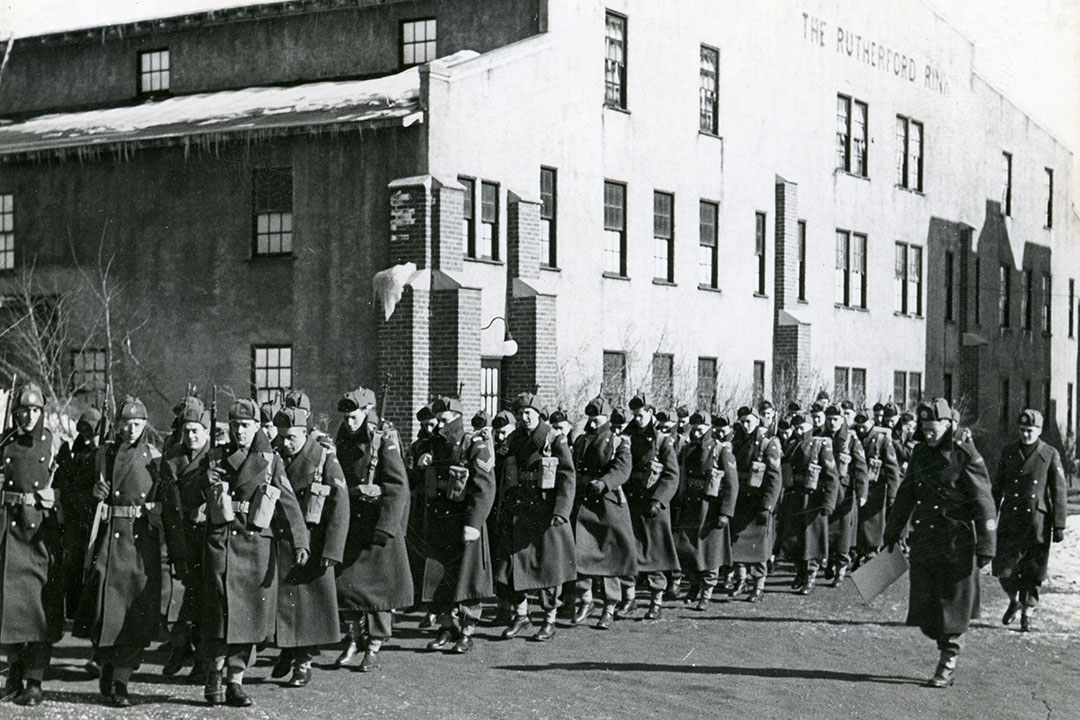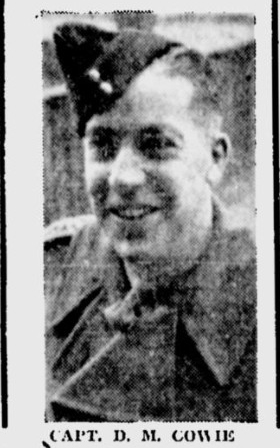
Service and sacrifice: Remembering Captain Cowie
Captain Donald MacArthur Cowie went from teaching in the classrooms of Saskatoon’s Mayfair School, to battling on the beaches of Normandy on D-Day.
By James ShewagaSeven years after graduating from the University of Saskatchewan (USask) in 1937 with a Bachelor of Science degree and education certificate, he made the ultimate sacrifice, killed in action while trying to save a fellow soldier. Cowie was one of more than 2,500 USask students, staff, faculty and alumni who served in the Second World War, and one of 202 who never came home.
It was a devastating loss for the Cowie family, mourned by his wife Margaret, mother Rhoda and father James, brother Marritt and sisters Marion and Rhoda. But there was also a solemn sense of pride in the family in the choice that he made to leave a successful career as a teacher and vice-principal, in order to volunteer to serve his country.
“It was a different time, and there was that sense of duty to their country, that was above all else,” said Cowie’s nephew Dr. Murray Tufts (PhD), who went on to follow his uncle and his mother Rhoda to study at USask and become a teacher and later a principal and superintendent in Saskatoon. “I know my mother was very proud of him, and my father and Don were good friends as well, playing tennis together and that kind of thing. He answered the call (of duty).”

A graduate of Nutana Collegiate and a member of USask’s class of 1937, Cowie returned to campus at the age of 28 when he joined the university’s contingent of the Canadian Officers Training Corps (COTC) in 1940. He later transferred from the Saskatchewan Light Infantry to the Cameron Highlanders of Ottawa, who landed on Juno Beach on D-Day, June 6, 1944. Three months later, while fighting to take the French port city of Boulogne, Cowie was killed trying to help one of his men who was wounded while on foot patrol.
“They were crossing a field that was mined and one went off and a friend was injured, so he went back to get him and stepped on a mine and both of them were lost,” said Tufts, whose wife Lorna also graduated from USask as a teacher.
Lorna’s father Glen Hartnett also served during the war as a pilot with the Royal Canadian Air Force and later became a professor in the College of Pharmacy (now the College of Pharmacy and Nutrition) until his retirement from the university in 1986. Cowie’s sister Marion, another USask graduate in the family, also answered the call of duty on the home front, moving to Ottawa to serve the Canadian war effort in a government post.
Cowie was one of more than one million Canadians who served in the Second World War, and one of 44,000 who lost their lives. In the bitter six-day battle to take the fortified port city of Boulogne, Cowie was one of 634 Canadian soldiers killed or wounded. Buried in the nearby Calais Canadian War Cemetery (Leubringhen) in France, his headstone bears the inscription “Don died as he lived – Unselfishly.”
It’s a testament to his character and to the sense of duty that drove so many Canadians to serve during the Second World War, at home and abroad.
“It’s quite a contrast to circumstances now when there is not really the same kind of universal respect and support for soldiers going to war, joining the military and going to fight in Afghanistan, for example,” said USask history professor Dr. Andrew Watson (PhD). “Going to fight the Nazis just seemed to be a very straightforward and obvious thing to do. Even if it was hard for some people to make the decision and commit to that, there was that grim determination that this is what we needed to do.”
Born in Neudorf on May 31, 1912, Captain Cowie was 32 when he died on Sept. 18, 1944.
Remembrance Day ceremony on campus
The University of Saskatchewan (USask) will host its Remembrance Day wreath-laying ceremony on Thursday, Nov. 11 at 1:30 pm at the Memorial Gates on campus.
USask’s annual wreath-laying ceremony has been held for 93 years since the opening of the historic Memorial Gates on campus in 1928. The annual ceremony recognizes the military contributions and sacrifices of our university community and honours all who served in the Canadian Armed Forces, in times of war and peace. The event is open to USask students, staff, faculty and alumni, as well as members of the community.
Visitors to campus will be required to follow USask’s vaccination measures and mask requirements.

